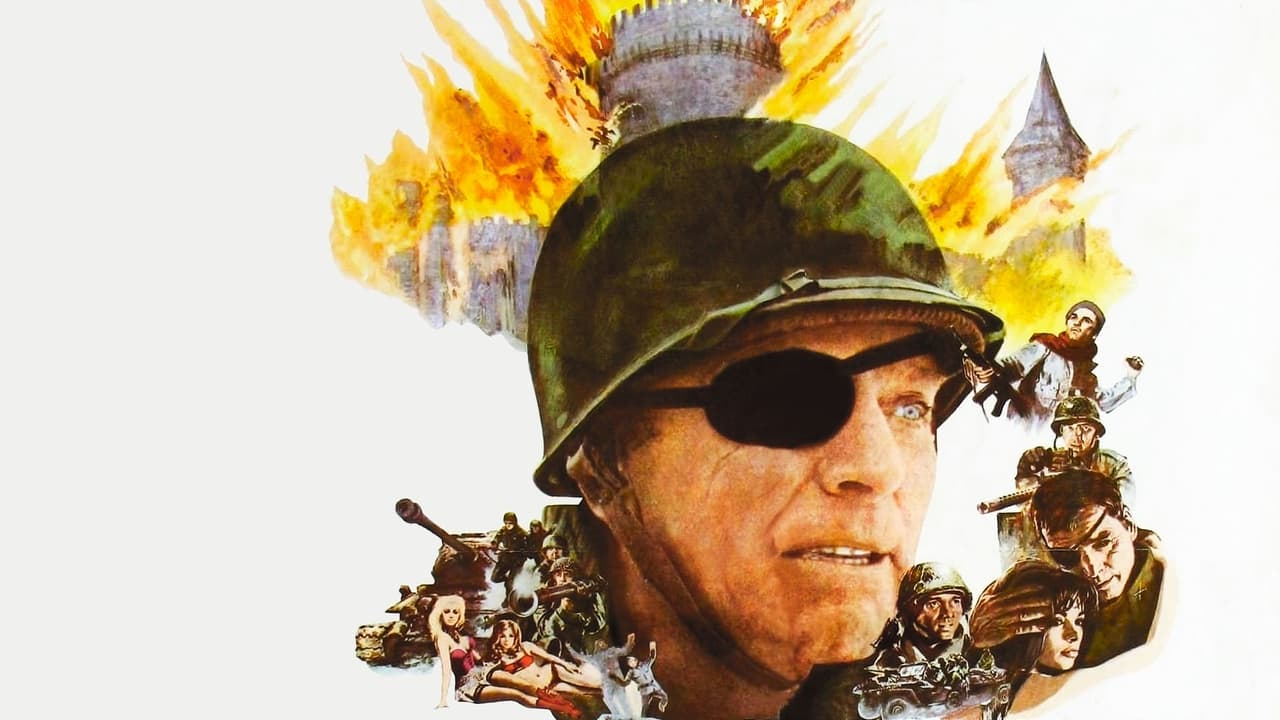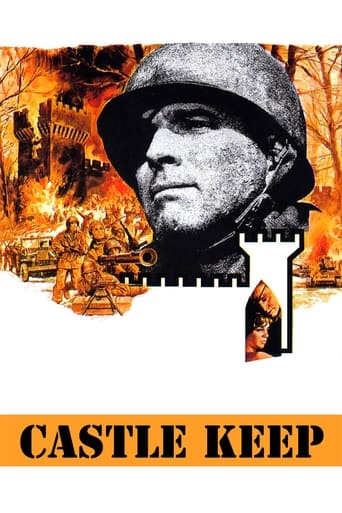

If a bunch of hippies teamed up with Federico Fellini to make a WW2 film after attending an anti Vietnam war rally, it would probably look something like director Sydney Pollack's "Castle Keep".Psychedelic, surreal and zany, "Castle Keep" opens with a series of dreamy shots. Stepping into focus is Major Falconer, a gung-ho military man in charge of a small company of men. Recognising that the German Army is advancing toward a nearby town, Falconer decides to turn a medieval castle into his own private fortress; the Germans will have to destroy it and him if they wish to advance any further.Fittingly for a film released in 1969, amidst the social turmoils of then-contemporary United States, Falconer's men are a gang of Vietnam-era slackers, shirts untucked, jaded, cynical and tired of killing. Falconer, infectiously played by Burt Lancaster, is the opposite. Square-jawed and mean as hell, Falconer exists for war."Keep's" second half revolves around a series of bizarre philosophical ruminations. Falconer says he wants to preserve life, land, people and things, but everything he does brings about utter destruction. In the end, killing "the enemy", for Falconer, necessitates destroying even the things he's sworn to protect. Better the world on fire than belonging to the "enemy". Art aficionado Captain Beckman (Patrick O'Neal) argues with Falconer, pleading with him to "preserve the beauty" of the castle and its many artifacts, but Falconer ignores him. Destruction, for Falconer, is its own brand of beauty.Late in the film, it is revealed that Falconer is sleeping with the wife (Astrid Heeren) of the Count (Jean-Pierre Aumont) to whom the castle belongs. The Count allows this, as he is impotent and wishes Falconer to provide him with an heir. In this way, Falconer's brand of 20st century violence is explicitly linked to the violence of feudal Europe. Indeed Falconer, a foot-soldier of "enlightened", "democratic nations", simply preserves the barbaric seeds of the monarchists before him. WW2 was itself but an extension of 19th century Imperialism, even a bogeyman like Hitler merely replicating what European and Western colonialists had, were and still are doing in America, Africa, Asia and Oceania. More importantly, Falconer's cosying up to aristocracy echoes the past 200 years of history, in which every supposed "enlightened" superpower has sided with, funded, armed or put in power monarchs, dictators or terrorist cells, from Vietnam to Russia, Saudi Arabia to Iraq; better devils than peace.Falconer's regressive ties with the past are brought up throughout the film. "We've been here before," soldiers repeatedly state, and the idea of "eternal recurrence" is a theme which runs throughout their escapades. Elsewhere there are suggestions that our band of heroes are already dead, that their castle exits in some kind of limbo (or purgatory), and that they're merely repeating battles that have already been fought and lost. "All of us had been killed twice, sometimes three times before," one Private Benjamin outright states, "maybe that's why we were at the castle".Other surreal moments occur. Sgt Rossi (Peter Falk) states that he was a baker before he enlisted. His homecoming fantasies are realised when he seduces the widow of a local bakery. Corporal Clearboy, a mechanic in the past, likewise falls in love with a Volkswagen Beetle – an illicit affair, as it's a German machine. These love affairs mirror that of Private Amberjack, a soldier who studied music as a kid. Amberjack finds a flute which allows him to befriend a German soldier. Then there's Captain Beckman, a famous art historian who just happens to find himself in a castle containing precious works of fine art. As the film progresses, the bakery, artwork, German, flute and Volkswagen will all be destroyed. The only one who gets what he loves, seems to be Falconer."Castle Keep" echoes the counterculture-inflected war films of the 1960s and 1970s ("Catch-22", "Kelly's Heroes", "Go Tell the Spartans", "MASH", "Dirty Dozen" etc). For Pollock, war is stupid, absurd, futile and benefits only psychopaths. But whilst Pollock embraces the cynicism of his contemporaries, aesthetically his film is something else. Opening with talk of fairy tales, and sporting its own "once upon a time" narrator, Pollock constructs something dreamy, surreal and filled with odd, incongruous moments. His soldiers seem caught out of time, as though they've stepped right out of a Sam Fuller movie and into a medieval fantasy. Shot in Yugoslavia, the film features fine photography by Henri Decae.7.9/10 – Flawed, but underrated. From the mid 1950s to the 1980s, Lancaster specialised in selecting interesting material. The majority of his pictures during this period are atypical of their genre or era.
... View MoreDuring World War II a small squad of 8 American soldiers led by Major Abraham Falconer (Burt Lancaster) relocate to a castle in Belguim. They rest there for awhile but then find themselves in the direct path of the advancing German army during the famous counter-offensive known as the "Battle of the Bulge". Rather than retreat and rejoin the main American army, Major Falconer decides to make a stand with his few men within the castle. Now, obviously the entire idea is ridiculous. But the director (Sydney Pollack) was trying to make a point about the insanity of war. The end result is a film that tries to be artistic and stylish for its time but, in my opinion, goes beyond the realm of believability. I say that because some of the scenarios are too far-fetched to be believed. For example, at one point a handful of prostitutes totally destroy a German tank with a few small Molotov cocktails. If that doesn't strain reality to the breaking point then another scenario a few minutes later features two American soldiers completely capturing another tank by firing a bazooka at it. Nevermind that a bazooka round would simply bounce off of the tank. Apparently the "message" was too important to be bothered by any sense of realism. Unfortunately, it gets even crazier when they decide to defend the castle. Only in Hollywood. Be that as it may, Burt Lancaster put on a decent performance and Astrid Heeren (as "Therese") was absolutely gorgeous. But other than that I found it difficult to get past the absurdity of it all.
... View MoreEight wounded shell shocked soldiers take refuge in a castle in Belgium. There they begin a crazy 60s psychedelic take on WWII involving wanton women, booze, an impotent Count, a young barren Countess, a Volkswagen beetle, a Romantic US Army Major, a baker and a band of AWOL Born Again Christians....to odd to even begin to explain. I'm sure there is meant to be some parallel to the Crucifixion of Jesus and maybe even his birth and the destruction of Jerusalem in the 1st Century but I'm not entirely sure I got it. Certainly not for everyone but somehow I couldn't help but watch in order to see what strangeness would happen next. I couldn't help but think this reminded me of parts of Apocalysoe Now and Platoon. It also has something to say about how micro societies are affected by war (perhaps?) as seen from the view of a castle which has been held by the same family for 17 Generations and believes itself to be above the trivialities of others' wars.
... View MoreI had been wanting to check this one out for over 20 years (it used to be available as a VHS rental at the local outlet but I never got around to it) but especially after reading up on the film on the internet since its 2004 DVD release(s) where its unusual "artiness" a'-la Alain Resnais' LAST YEAR IN MARIENBAD (1961) was played up. Now that I've watched CASTLE KEEP for myself, all I can say is that it's arguably the strangest mainstream war movie ever and decidedly not for all tastes!The relatively large cast (for what turns out to be an introspective film) is uniformly excellent and is well up to the requirements of the brilliantly surreal, funny and literate script; Burt Lancaster, wearing an eye-patch throughout, has an unsympathetic role as the formidable leader of a group of misfit soldiers taking over a Belgian castle against unseen invading German troops. He is skillfully abetted by Peter Falk (as a soldier who abandons his post to indulge in his vocation as a baker), Jean-Pierre Aumont (as the "degenerate" owner of the titular castle), Patrick O'Neal (as a celebrated art historian all at sea on the battleground but well in his element surrounded by the castle's objets d' art), Scott Wilson (as a soldier who gets into quite a unique relationship more on this later), Tony Bill (as the most spiritual of the men) and, the other side of the coin, Bruce Dern as a Bible-thumping conscientious objector who walks the Belgian rubbles with his ragged band of revivalist deserters-followers. The terrific cinematography of the awesome European locations courtesy of Henri Decae is complimented by a fine Michel Legrand score and, when they finally come, spectacular battle sequences.But it's the odd, surreal touches including Scott Wilson falling in love with a Volkswagen, the same car rising from the sea after it has been drowned by his envious companions and floating ashore all by itself, the moving sequence between Tony Bill and an unseen German soldier (subsequently needlessly shot by Peter Falk) where the latter teaches the former how to play the flute correctly, the unusually realistic talk of fornication, sexual organs, impotence, the ambiguous (perhaps ghostly) nature of the characters involved and the events being enacted, etc. which really make this show stand out from the crowd of WWII spectaculars and stick in one's memory not to mention endear it to its legion of fans (who have famously decried online its original abominable pan-and-scan DVD incarnation, forcing Sony to re-release it in the correct Widescreen aspect ratio a mere four months later). The theme of the relevance of art in times of war brings forth comparisons to John Frankenheimer's THE TRAIN (1964), also starring Burt Lancaster, whose third (and final) collaboration with director Sydney Pollack after the previous year's THE SCALPHUNTERS and THE SWIMMER (where Pollack replaced original director Frank Perry but goes uncredited) this proved to be perhaps as a result of the critical beating the film received upon its original release!
... View More